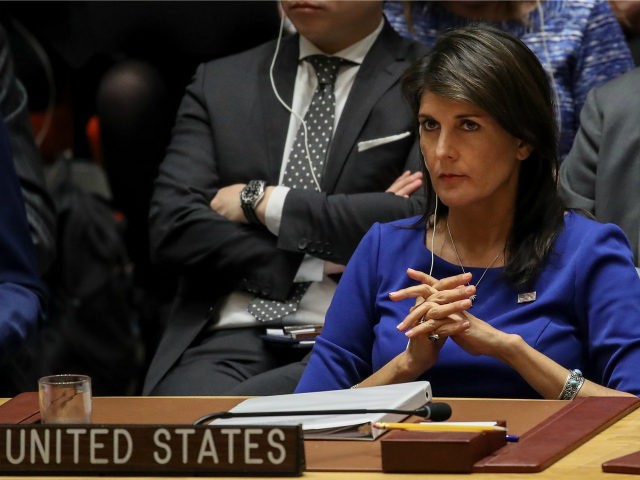Secretary of State Mike Pompeo and U.N. Ambassador Nikki Haley are expected to announce the withdrawal of the United States from the U.N. Human Rights Council on Tuesday afternoon, according to various reports.
The decision was reportedly based on the Council’s bias against Israel and its extension of membership to notorious human rights abusers.
The U.N. Human Rights Council was established in 2006 as a successor to the Human Rights Commission, which was criticized for politicized abuse and the unrepentantly oppressive practices of many member states, exactly as the Trump administration is criticizing the Human Rights Council today.
The Bush administration resisted joining the HRC precisely because there were doubts it would be a great improvement over its embarrassing predecessor organization, but the Obama administration decided to join in order to “make it a more effective body to promote and protect human rights,” as then-Secretary of State Hillary Clinton and U.N. Ambassador Susan Rice said in 2009.
Bloomberg News notes the HRC began its latest session on Monday by discussing the U.S. media’s new obsession, the “policy of separating children from parents crossing the southern border illegally,” which High Commissioner for Human Rights Zeid Ra’ad al-Hussein called “unconscionable.”
However, Bloomberg notes the decision to withdraw has been developing for a long time:
National Security Adviser John Bolton opposed the body’s creation when he was U.S. ambassador to the UN in 2006. In a speech to the council last year, [current U.N. Ambassador Nikki] Haley called out the body for what she said was its “relentless, pathological campaign” against Israel. She has also called for ways to expel members of the council that have poor human rights records themselves.
“For our part, the United States will not sit quietly while this body, supposedly dedicated to human rights, continues to damage the cause of human rights,” Haley said at the time. “In the end, no speech and no structural reforms will save the members of the Human Rights Council from themselves.”
Politico adds that the administration “first mulled quitting the council within weeks of Trump’s inauguration but decided to hold off in the hopes that it could push through reforms.”
Haley criticized the HRC for its constant bias against Israel, which has been condemned by more resolutions than the entire rest of the world combined; for tolerating “not free” and “partly free” governments in the majority of its 47 seats, including some of the world’s most repressive regimes; and for tackling only the “low-hanging fruit” of human rights violations instead of doing the hard work of confronting powerful abusers with HRC memberships.
Haley’s reform agenda included competitive council elections, an end to secret ballots, and terminating support for the anti-Israel BDS movement.
The Associated Press cited Trump administration officials who said the administration concluded “its efforts to promote reform on the council had failed and that withdrawal was the only step it could take to demonstrate its seriousness.”
“A pullout could be largely symbolic: The United States’ current term on the council ends next year, when it could revert to the observer status held by other countries that are not members. In that situation, the U.S. would be able to speak out on rights abuses, but not to vote,” the AP observed.

COMMENTS
Please let us know if you're having issues with commenting.